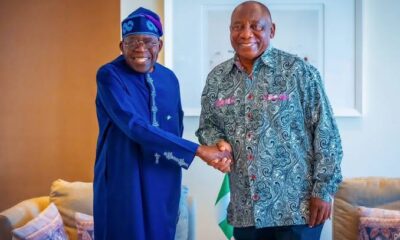Strictly Personal
With elections and NHI, this is a big year for healthcare in SA, By Marcus Low
Published
6 months agoon

South Africa is barrelling towards its most consequential and most competitive national and provincial elections since 1994, expected to take place in May. That the ANC’s share of the vote, will be further eroded this year seems inevitable, given ongoing power cuts, failing railways, water management problems, high crime rates, and dysfunctional basic education and public health systems.
Covering elections is tricky at the best of times for media houses. Spotlight plans to follow the advice of Jay Rosen, journalism professor at New York University, to focus on reporting “not the odds, but the stakes”. As far as the odds does go, however, it seems likely that the ANC – alone or in coalition – will govern nationally, but they could lose power in the country’s two most populus provinces, Gauteng and KwaZulu-Natal.
The stakes in these two provinces could not be higher when it comes to healthcare. The day-to-day running of our public healthcare system is after all the domain of provincial health departments.
Limping from crisis to crisis
Take Gauteng. From alleged health department corruption worth more than R1.2 billion in 2007/2008, to the Life Esidemini tragedy of 2016, to more recent issues such as the lacklustre response to alleged corruption at Tembisa Hospital, ongoing problems with food and security contracts, and the persecution of whistleblowers like Dr Tim de Maayer, the province’s health department has stumbled from crisis to crisis under the ANC for well over a decade now. New starts under new members of the executive council (MECs) and heads of department have been a dime a dozen, but if anything, the quality of governance has decayed over time. What is at stake is literally basics like whether there is sufficient food available for people in hospital.
There is, of course, no guarantee that this atrocious situation will be turned around if, for instance, a multi-party coalition of the DA, Action SA and others run the province – but the prospect of such a change certainly is intriguing. Just imagine the DA’s Jack Bloom having a go as Gauteng’s MEC for Health after decades of holding other MECs and heads of department to account from the sidelines.
The future of NHI
The year’s other headlining health story seems set to again be National Health Insurance (NHI), which promises healthcare for all – employed or unemployed – South Africans, permanent residents, refugees, inmates, and specific categories of foreign nationals. After making it through Parliament at the end of last year, the NHI Bill is likely to be signed into law by President Cyril Ramaphosa any day now. Much of the bill won’t come into effect for quite some time, and we are sure to see several court cases challenging its constitutionality. There is also an outside chance that later this year the balance of power in Parliament could shift against NHI, or at least certain elements of NHI. It is not too much of a stretch to say the future of NHI is one of several important things on the line at the ballot box.
Also at stake in the elections is government’s response to seemingly intractable problems like South Africa’s shortage of healthcare workers, budget shortfalls, and health sector corruption. It would be naïve to think a change in power will solve these problems overnight – much of the world is struggling with shortages of healthcare workers and South Africa’s budget restraints are all too real, but some will argue that a change in power may nevertheless be a necessary first step given the extent to which all three of these issues have been allowed to drift in recent years. There is certainly an argument to be made that the current lack of progress is rooted in a lack of state capacity and that the lack of state capacity, in turn, is a consequence of the ANC’s explicit policy of cadre deployment.
Whether or not voters again back the ANC, some specific questions should provide a good gauge of progress in 2024. Will we finally see convictions for the alleged corruption uncovered by public servant Babita Deokaran? Will government publish an implementation plan for addressing our healthcare worker crisis (we already have a good strategy) and, this is the key, put money and political capital behind its implementation? Will the new Parliament pass a good State Liability Bill (which could help reduce the state’s liability for medico-legal claims) and finally get round to amending South Africa’s Patents Act to better balance medicine monopolies with the right to health (as set out in a policy adopted by cabinet back in 2018)? Will the establishment of the National Public Health Institute of South Africa remain stalled? Will government continue to ignore recommendations from the Competition Commission’s Health Market Inquiry on how to better regulate private healthcare in South Africa (the commission’s very impressive report was published in 2019)? Will the new health MECs and heads of provincial health departments appointed after the elections bring real change?
HIV, TB and NCDs
The National Department of Health has generally produced good HIV and tuberculosis (TB) policy over the last decade or so. In some respects, those policies have been well implemented – think the massive amount of HIV testing done in the country, in other respects they have been undermined by the general dysfunction in the public healthcare system – think long queues, staff shortages, and poor TB screening and infection control. Some innovations, like pills to prevent HIV or new TB treatments, could have been rolled out more quickly and better marketed to users.
At stake in the elections is thus not so much whether we produce good policies in areas such as HIV, TB and non-communicable diseases (NCDs), but whether we will get the leadership we need to ensure better and faster implementation of those policies.
On the HIV front, we will be keeping a close eye this year on the ongoing rollout of HIV prevention pills. While the rollout has gathered some momentum in recent years, the pills are generally still too hard to get hold of for those who could most benefit from it. Pilot projects should shed light on how to best make breakthrough new HIV prevention injections available in South Africa, but the high price of these injections is likely to mean the many young women who could most benefit from it won’t be able to get it.
New HIV figures from Tembisa, the leading mathematical model of HIV in South Africa, will be keenly watched this year since it will integrate recent findings from the Human Sciences Research Council (HSRC) survey (which contained some unexpectedly positive numbers). On the negative side, the HSRC survey also indicated that condom use was significantly down in 2022 compared to 2017 – this while a recent HIV investment case found that condoms are the only cost-saving HIV intervention for the health system. Either way, the extent to which condoms are made easily available will remain an important measure of government’s commitment to fighting HIV, both now and after the elections.
Last year, we saw significant changes in how TB is tested for and treated in South Africa. In short, many more people became eligible for TB tests and eligibility for TB preventive therapy was dramatically expanded. How impactful these new policies will be this year will depend on how well they are implemented, which again brings us back to the ongoing problems of healthcare worker shortages and a lack of management capacity in most of our provincial health departments. Maybe then, in a context of generally reasonable HIV and TB policy, what matters is not so much what different political parties have to offer on these diseases specifically, but what they can do to improve the functioning of our healthcare system more generally.
That said, one notable thing with TB is that, despite South Africa having often made good TB policy and having played an important role in raising the profile of TB at the United Nations, TB has never really become a political or elections issue here in the way one might expect from a disease that claims over 50 000 lives, of mostly poor people, in the country per year. So far, there is no indication that any political parties are set to change this in 2024.
Finally, while the long-term trends with HIV and TB are downward, the trend with non-communicable diseases (NCDs) like diabetes and hypertension in South Africa is in the opposite direction. Government has set HIV-style diabetes and hypertension targets and published a national plan, but again there are serious questions about whether these plans will be implemented and whether the public health system has the capacity to offer the levels of testing, treatment and care that is required. Meanwhile, breakthrough weight loss medicines that made headlines in 2023 are likely to remain out of reach for most people in South Africa and interventions like the sugar tax will remain highly contested before and after the elections.
Whatever happens at the ballot box, one thing is clear, given the rising NCD threat, healthcare worker shortages, budget shortfalls, and endemic corruption, whoever is in power nationally and provincially after this year’s elections will have their work cut out for them. While we will not endorse any political parties at Spotlight, we do urge voters to consider what is at stake in these elections when it comes to healthcare. Part of the picture will of course be painted by political party manifestos (which we will analyse in detail in the coming months), but as important as the policies, is the track record of what parties have done when they’ve held power. Whether in Gauteng, the Western Cape, or nationally, voters will hopefully send a clear message on whether or not they think those currently in power are on the right track.
You may like
-


SA mobility startup LULA acquires UK-based Zeelo’s operations
-


Nigeria to strengthen defence partnership with South Africa
-


South Africa succumbs to India in T20 World Cup finals
-


South Africa: Opposition DA party suspends MP over racist remarks from old videos
-


Tunisia: President Said sacks minister over Hajj accident
-


Nigeria, South Africa resolve on better trade relations
Strictly Personal
All eyes in Africa are on Kenya’s bid for a reset, By Joachim Buwembo
Published
5 days agoon
July 21, 2024
Whoever impregnated Angela Rayner and caused her to drop out of school at the tender age of 16 with no qualifications might be disappointed that we aren’t asking who her baba mtoto (child’s father) is; whether he became a president, king or a vagabond somewhere, since the girl ‘whose leg he broke’ is now UK’s second most powerful person, 28 years since he ‘stole her goat’.
Angela’s rise to such heights after the adversity should be a lesson to countries which, six decades after independence, still have millions of citizens wallowing in poverty and denied basic human dignity, while the elite shamelessly flaunt obscene luxury on their hungry, twisted faces.
After independence, African countries also suffered their adolescent setbacks in the form of military coups. Uganda’s military rule lasted eight years, Kenya’s about eight hours on August 1, 1982, while Tanzania’s didn’t materialise and its first defence chief became an ambassador somewhere.
What we learn from Angela Rayner is that when you’re derailed, it doesn’t matter who derailed you, because nobody wants to know. What matters is that you pick yourself up, not just to march on, but to stand up and shine.To incessantly blame our colonial and slave-trading ‘derailers’ while we treat our fellow citizens worse than the colonialists did only invites the world to laugh. Have you ever read of a colonial officer demanding a bribe from a local before providing the service due?
African countries today need to press ‘reset’. A state operates by written policies, plans, strategies and prescribed penalties with gazetted prisons for those who break the rules. This is far more power than teenage Angela had, so a reset state should take less time to become prosperous than the 28 years it took her to get to the top after derailing.
So it’s realistic for countries to operate on five-year planning and electoral cycles, so a state that fails to implement a programme in five years has something wrong with it. It needs a reset.
A basic reset course for African leaders and economists should include:
1. Mindset change: Albert Einstein teaches us that no problem can be solved from the same level of consciousness that created it. For example, if you are in debt, seeking or accepting more debt is using the same level of thinking that put you there. If you don’t like Einstein’s genius, you can even try an animal in the bush that falls into a hole and stops digging. Our economists are certainly better than a beast in the bush.
2. Stealing is wrong: African leaders and civil servants need to revisit their catechism or madarasa – stealing public resources is as immoral as rape.
3. Justifying wrong doesn’t make it right: Using legalese and putting sinful benefits in the budget is immoral and can incite the deprived to destroy everything.
4. Take inventory of your resources and plan to use them: If Kenya, for example, has a railway line running from Mombasa to Nairobi, is it prudent to borrow $3.6 billion to build a highway parallel to it before paying off and electrifying the railway?
If Uganda is groaning under a $2 billion annual petrol import bill, does it make sense to beg Kenya for access to import more fuel, when Kampala is already manufacturing and marketing electric buses, while failing to use hundreds of megawatts it generates, yet the country has to pay for the unused power?
If Tanzania… okay, TZ has entered the 21st Century with its electric trains soon to be operating between Dar es Salaam and Morogoro. Ethiopia, too, has connected Addis Ababa to the port of Djibouti with a 753-kilometre electric railway, and moves hundreds of thousands of passengers in Addis every day by electric train.
5. Protect the environment: We don’t own it, we borrowed it from our parents to preserve it for our children. Who doesn’t know that the future of the planet is at stake?
6. Do monitoring and evaluation: Otherwise you may keep doing the same thing that does not work and hope for better results, as a sage defined lunacy.
7. Don’t blame the victims of your incompetence: This is basic fairness.
We could go on, but how boring! Who doesn’t know these mundane points? We are not holding our breath for Angela’s performance, because if she fails, she will be easily replaced. Africa’s eyes should now be on Kenya to see how they manage an abrupt change without the mass bloodshed that often accompanies revolutions.
Strictly Personal
The post-budget crisis in Kenya might be good for Africa, after all, By Joachim Buwembo
Published
2 weeks agoon
July 10, 2024
The surging crisis that is being witnessed in Kenya could end up being a good thing for Africa if the regional leaders could step back and examine the situation clinically with cool-headed interest. Maybe there is a hand of God in the whole affair. For, how do explain the flare not having started in harder-pressed countries such as Zambia, Mozambique and Ghana?
As fate would have it, it happened in East Africa, the region that is supposed to provide the next leadership of the African Union Commission, in a process that is about to start. And, what is the most serious crisis looming on Africa’s horizon? It is Debt of course.
Even the UN has warned the entire world that Africa’s debt situation is now a crisis. As at now, three or four countries are not facing debt trouble — and that is only for now.
There is one country, though, that is virtually debt-free, having just been freed from debt due to circumstances: Somalia. And it is the newest member of the East African Community. Somalia has recently had virtually all its foreign debt written off in recognition of the challenges it has been facing in nearly four decades.
Why is this important? Because debt is the choicest weapon of neocolonialists. There is no sweeter way to steal wealth than to have its owners deliver it to you, begging you, on all fours, to take it away from them, as you quietly thank the devil, who has impaired their judgement to think that you are their saviour.
So?
So, the economic integration Africa has embarked on will, over the next five or so years, go through are a make-or-break stage, and it must be led by a member that is debt-free. For, there is no surer weapon to subjugate and control a society than through debt.
A government or a country’s political leadership can talk tough and big until their creditor whispers something then the lion suddenly becomes a sheep. Positions agreed on earlier with comrades are sheepishly abandoned. Scheduled official trips get inexplicably cancelled.
Debt is that bad. In African capitals, presidents have received calls from Washington, Paris or London to cancel trips and they did, so because of debt vulnerability.
In our villages, men have lost wives to guys they hate most because of debt. At the state level, governments have lost command over their own institutions because of debt. The management of Africa’s economic transition, as may be agreed upon jointly by the continental leaders, needs to be implemented by a member without crippling foreign debt so they do not get instructions from elsewhere.
The other related threat to African states is armed conflict, often internal and not interstate. Somalia has been going through this for decades and it is to the credit of African intervention that statehood was restored to the country.
This is the biggest prize Africa has won since it defeated colonialism in (mostly) the 1960s decade. The product is the new Somalia and, to restore all other countries’ hope, the newly restored state should play a lead role in spreading stability and confidence across Africa.
One day, South Sudan, too, should qualify to play a lead role on the continent.
What has been happening in Kenya can happen in any other African country. And it can be worse. We have seen once promising countries with strong economies and armies, such as Libya, being ravaged into near-Stone Age in a very short time. Angry, youthful energy can be destructive, and opportunistic neocolonialists can make it inadvertently facilitate their intentions.
Containing prolonged or repetitive civil uprisings can be economically draining, both directly in deploying security forces and also by paralysing economic activity.
African countries also need to become one another’s economic insurance. By jointly managing trade routes with their transport infrastructure, energy sources and electricity distribution grids, and generally pursuing coordinated industrialisation strategies in observance of regional and national comparative advantages, they will sooner than later reduce insecurity, even as the borders remain porous.
EDITOR’S PICK


Trevor Noah set for ‘Off the Record’ world tour
South African comedian and talk show host, Trevor Noah, has announced a date for his “Off The Record” global tour...


SA mobility startup LULA acquires UK-based Zeelo’s operations
South Africa’s mobility startup, LULA, has announced the acquisition of the operations of UK-based Zeelo in a move that will...


Ngannou accuses Joshua of employing dirty tactics in their fight in Saudi Arabia
Former UFC heavyweight champion, Francis Ngannou, has accused British-Nigerian boxer, Anthony Joshua, and his promotion team of employing unfair and...


#EndBadGovernance Protests: Please be patient with Tinubu’s govt, monarchs beg Nigerian youths
Some prominent traditional rulers in Nigeria have pleaded with Nigerian youths and organizers of the planned nationwide #EndBadGovernance protests scheduled...


UNESCO removes Senegal’s Niokolo-Koba National Park from list of World Heritage sites in danger
The United Nations’ Educational, Scientific and Cultural Organization (UNESCO) has removed Senegal’s Niokolo-Koba National Park from the list of World...


At Project Aliyense discourse, panelists call for balance between free speech, ethical considerations
The government has been urged to balance freedom of speech with ethical considerations and laws that prevent harm to others....


Adenia Partners acquires Air Liquide’s operations in 12 African countries
Adenia Partners, a leading private equity firm, has completed the acquisition of Air Liquide’s operations in 12 African countries, adopting...


We will handle planned nationwide protests as family matter— Nigerian Govt
The Nigerian government says it will handle the planned #EndBadGovernance protests scheduled to commence on August 1 as a family...


Veteran Nigerian entertainer Charly Boy vows to divorce wife if Kamala Harris doesn’t win US presidential election
Veteran Nigerian entertainer, Charles Oputa, popularly known as Charly Boy, has vowed to divorce his wife of 47 years if...


Saudi club Al Hilal places African transfer record bid for Osimhen
Saudi Arabia club side, Al-Hilal, have reportedly made an African transfer record bid for Super Eagles and Napoli striker, Victor...
Trending
-

 Sports1 day ago
Sports1 day agoMeet Nigerian-born players doing big things for Japan at Paris 2024 Olympics
-

 Metro2 days ago
Metro2 days agoWe will handle planned nationwide protests as family matter— Nigerian Govt
-

 Metro15 hours ago
Metro15 hours ago#EndBadGovernance Protests: Please be patient with Tinubu’s govt, monarchs beg Nigerian youths
-

 Tech2 days ago
Tech2 days agoAdenia Partners acquires Air Liquide’s operations in 12 African countries


